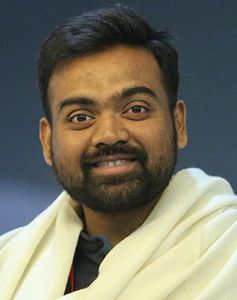Dr B.R. Ambedkar, both as an idea and an individual, will continue to inspire generations to come. Some years ago, a news channel conducted a survey on the greatest Indian ever, and Ambedkar figured at the top. A statue that can be seen even in the remotest corners of the country is that of Ambedkar, [standing tall] with the Constitution in one hand and the index finger of the other hand pointing ahead, indicating a future of hope and promise for millions of dalits and the socially marginalised communities. Over the years, unfortunate incidents of disfigurement of those statues have also declined owing to the rising assertion ad aspiration of dalit leadership, from politics to academia.
Ambedkar and his legacy
Ambedkarites across the world have often registered the protest that his legacy was restricted, as he is only remembered exclusively as the leader of the depressed classes. His contributions as a foremost thinker on economics, finance, security and a range of other theoretical matters were undermined to promote and perpetuate the legacy of other contemporary leaders like Jawaharlal Nehru. Nehru, in his obituary address for Ambedkar in the Rajya Sabha, said, “Dr Ambedkar from many, many years had been a very controversial figure in Indian public affairs, but there can be no doubt about his outstanding quality, his scholarship, and the intensity with which he pursued his convictions, sometimes rather with greater intensity than perhaps required by the particular subject, which sometimes reacted in a contrary way.” Contemporary political rivalries must have been the flavour of the season, but systematically reducing the legacy of an individual who had the audacity to reimagine realities for his people certainly smirks of arrogance and hatred.
Ambedkar as a thought leader remains an unexplored universe for scholastic investigation. His bust is present at the Lehman Social Sciences Library at Columbia University in New York, from where he took his PhD. His views and ideas on financial federalism and demonetisation continue to generate interest among scholars and intellectuals.
At a gathering of students of Lucknow University in 1951, Ambedkar forewarned: “The government’s foreign policy failed to make India stronger. Why should India not get a permanent seat in the UN Security Council? Why has the prime minister not tried for it? India must choose between parliamentary democracy and the Communist way of dictatorship and come to a final conclusion.” This is strategic thinking of the highest order. Sadly, this aspect of Ambedkar was also forgotten.
Also read
- Why everyone wants a piece of Ambedkar
- How Ambedkar's family supported him in his journey
- Ambedkar continues to live in these places
- Ambedkar trivia: “I will not die a Hindu”, weak in maths and more
- A 95-year-old's memory of Ambedkar's final speech as drafting committee chairman
- Ambedkar believed political democracy relied upon social cohesion, fraternity
For a person who single-handedly reshaped the future of millions of dalits and tribal communities, Ambedkar was not conferred the country’s topmost civilian honour―Bharat Ratna―even decades after his death. It raises legitimate concerns and questions over the intentions of those who ruled India during that period.
In the first general elections of 1952, Ambedkar contested from Bombay City North constituency. Two members were to be elected from the constituency, including one from the scheduled castes. Ambedkar’s main opponent was Narayan Sadoba Kajrolkar of the Congress. Despite Ram Manohar Lohia’s backing, Ambedkar lost by almost 15,000 votes.
The Congress and its leadership left no stone unturned to undo Ambedkar’s legacy and demean him when he was alive and when he left us.
Modi government and Ambedkar
Ambedkar saw inequality, both social and economic, as a challenge for independent India. It took more than seven decades for a woman from one of the most backward regions to reach the highest constitutional office in the country. The phenomenal story of Droupadi Murmu is a glowing tribute to the legacy of Ambedkar. A woman from a tribal community replacing a man from the dalit samaj at the Rashtrapati Bhavan has a special resonance for millions of disadvantaged groups in the country. With 27 OBC members, 12 dalits and eight scheduled tribe members in the Union cabinet, the Modi government has walked the talk when it comes to giving dignity to the marginalised. The idea is to venture beyond the conventional contours of symbolism―to take Ambedkar beyond the ceremonial April 14 (birth anniversary) and December 6 (death anniversary) protocol.
However, there are institutions that still lack social diversity and therefore empathy for the marginalised. The judiciary, the media and business houses need deep interventions to ensure equitable representation. There are questions on atrocities in the name of caste as well that need answers and collective societal introspection. Ahead of this Republic Day, we must confront ourselves with these realities and endeavour to have a national conversation on ending social disabilities.
―Paswan is national spokesperson for the BJP, co-author of Makers of Modern Dalit History and assistant professor of law at Patna University.



